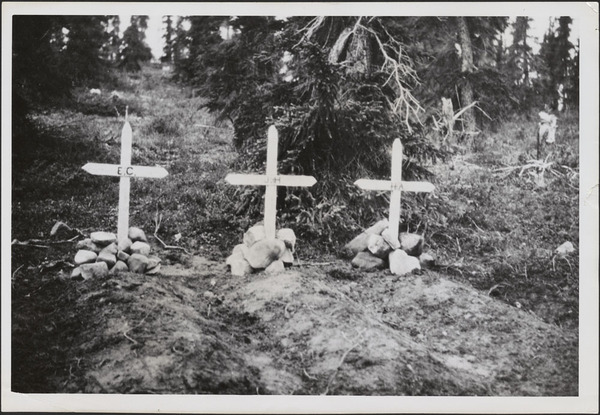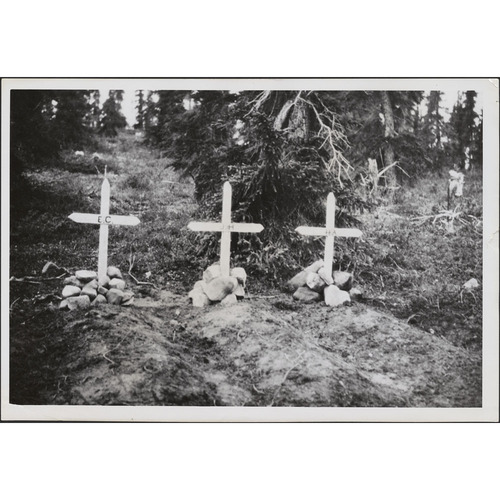HORNBY, JOHN, northern traveller and soldier; b. 21 Sept. 1880 in Church Minshull, England, youngest son of Albert Neilson Hornby and Ada Sara Ingram; d. unmarried 16 April 1927 on the Thelon River, N.W.T.
Jack Hornby’s father, whose family were cotton magnates in Blackburn, Lancashire, captained England in both cricket and rugby. Herbert Ingram, his maternal grandfather, had owned the Illustrated London News. His brother Albert Henry led Lancashire’s cricket team; his other brothers would predecease him: George in Africa in 1905 and Walter of wounds at the end of World War I. Like his father and brothers, he was educated at Harrow (1894–98). Afterwards he lived in Germany to learn the language as part of an uncompleted diplomatic training.
In 1904 Hornby came to Canada to visit a cousin, Cecil Armitstead, at Onoway, near Edmonton. After three years exploring and working in the Lac Ste Anne area of Alberta, he freighted for surveyors on the Grand Trunk Pacific Railway in 1907. His first journey into the Barren Ground of the North-West Territories began the next year, with a trading and hunting party led by fellow Englishman James Cosmo Dobrée Melvill. The group spent the winter on Great Bear Lake (1908–9), visited the Coppermine River district (1909–10), and wintered again on Great Bear (1910–11). This is when, as author George Whalley describes it, Hornby’s “fatal devotion” to the Barren Ground began. Hornby subsequently connected himself to the missionary expedition of Jean-Baptiste Rouvière, an Oblate priest. In 1912 he travelled with Canadian engineer George Mellis Douglas to the Coppermine, a journey described by Douglas in Lands forlorn . . . (New York, 1914).
Following the outbreak of war in 1914, Hornby joined the 19th (Alberta) Dragoons as a private. He survived the first use of poison gas in warfare at Ypres (Ieper), Belgium, on 22 April 1915. In September he applied for a commission in the South Lancashire Regiment and was gazetted second lieutenant. In June 1916, shortly before the battle of the Somme, he received the Military Cross. Wounded in the back and shoulder during this battle, he was invalided to England. Once his injuries had healed, he walked out of a convalescent hospital near London and by September he had returned to Canada. In December he was decommissioned on account of ill health.
Funded by his mother, Hornby wandered in British Columbia and the north, trapping, hunting, and at times barely surviving. From 1923 to 1925 he explored and trapped in the Artillery Lake–Thelon River area with James Charles Critchell-Bullock, a retired British officer. After attending his father’s funeral in England in December 1925, he came back to Canada in 1926 accompanied by a young cousin, Edgar Vernon Christian. Hornby took him and a former Royal Air Force officer, Harold Challoner Evan Adlard, into the Barren Ground to winter in the Thelon–Dubawnt River region. Though Hornby prided himself on being able to live off the land – an ability some questioned – the migrating caribou failed to come and, lacking sufficient supplies, the party starved to death in the spring of 1927. Christian, the last of the three to succumb, left a diary describing their experience. Their bodies, left alone by prospectors who discovered the party’s cabin in July 1928, were buried nearby the following summer by the Royal Canadian Mounted Police.
What motivated John Hornby to lose himself in the north? Even before the Great War he had tried to winter there with inadequate supplies, but following the trauma he suffered in the war, which probably led to post-traumatic stress disorder, his desire to risk his life and the lives of others intensified. His sense of guilt over having survived the war was likely increased by the deaths of his two brothers and his father. By a cruel irony he took two younger men with him when he perished in 1927.
E. [V.] Christian, Unflinching: a diary of tragic adventure, intro. and conclusion B. D. Roberts (London, 1937). Death in the Barren Ground: Edgar Christian, ed. George Whalley ([Ottawa], 1980). Clive Powell-Williams, Cold burial: a true story of endurance and disaster (New York, 2002). Malcolm Waldron, Snow man: John Hornby in the Barren Lands (Boston, 1931; repr., intro. Lawrence Millman, 1997). George Whalley, The legend of John Hornby (Toronto, 1962).
Cite This Article
John Ferns, “HORNBY, JOHN,” in Dictionary of Canadian Biography, vol. 15, University of Toronto/Université Laval, 2003–, accessed February 13, 2026, https://www.biographi.ca/en/bio/hornby_john_15E.html.
The citation above shows the format for footnotes and endnotes according to the Chicago manual of style (16th edition). Information to be used in other citation formats:
| Permalink: | https://www.biographi.ca/en/bio/hornby_john_15E.html |
| Author of Article: | John Ferns |
| Title of Article: | HORNBY, JOHN |
| Publication Name: | Dictionary of Canadian Biography, vol. 15 |
| Publisher: | University of Toronto/Université Laval |
| Year of publication: | 2005 |
| Year of revision: | 2005 |
| Access Date: | February 13, 2026 |




